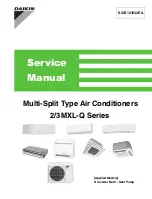
Notes for heating
*
The fan of the indoor unit will not start running immediately after the heating is
started to avoid blowing out cool air.
*
When it is cold and wet outside, the outdoor unit will develop frost over the heat
exchanger which will compromise the heating capacity. This is when the air
conditioner will start defrost.
*
During defrost, the air conditioner will stop heating for about 5-12 minutes.
*
Vapor may come out from the outdoor unit during defrost. This is not a malfunction,
but a result of fast defrost.
*
Heating will resume after defrost is complete.
Notes for turning off
*
When the air conditioner is turned off, the main controller will automatically decide
whether to stop immediately or after running for dozens of seconds with lower
frequency and lower air speed.
Notices for use
- 6 -
The
conditions
of
unit
can
'
t
normally
run
*
Within the temperature range provided in following table, the air conditioner may
stop running and other anomalies may arise.
*
When the temperature is too high, the air conditioner may activate the automatic
protection device, so that the air conditioner could be shut down.
*
When the temperature is too low, the heat exchanger of the air conditioner may
freeze, leading to water leakage or other malfunction.
*
In long-term cooling or dehumidification with a relative humidity of above 80%
(doors and windows are open), there may be water condenses or dripping near
the air outlet.
*
T1 and T3 refer to ISO 5151.
Cooling
Heating
Indoor
Outdoor
Indoor
Outdoor
<
18
℃
>
24
℃
<
-7
℃
>
27
℃
>
52
℃
(Apply to T3)
>
43
℃
(Apply to T1)









































